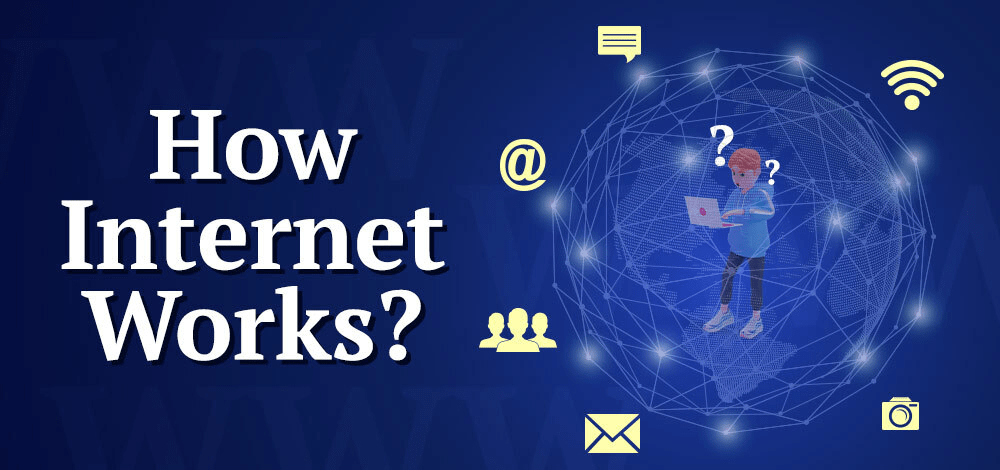Do You Know How To Work Internet ? The internet is a vast network that connects millions of devices worldwide, allowing them to communicate and share information. Here’s a breakdown of how it generally works
Infrastructure:
- Cables and Connections: Undersea cables, fiber-optic cables, satellites, and wireless connections form the physical infrastructure of the internet. These connect different regions and countries, enabling global communication.
- Data Centers: These facilities house servers and networking equipment. They store and manage vast amounts of data, ensuring accessibility and reliability for various online services.
How To Work Internet Protocols and Standards:
- TCP/IP: Transmission Control Protocol (TCP) and Internet Protocol (IP) are foundational protocols for data transmission and routing. TCP breaks data into packets and ensures their reliable delivery, while IP handles addressing and routing.
- HTTP/HTTPS: Hypertext Transfer Protocol (HTTP) and its secure version (HTTPS) dictate how web browsers and servers communicate. They define how data is requested and delivered when accessing websites.
- DNS: Domain Name System (DNS) translates domain names (like google.com) into IP addresses. It acts as a directory that helps your device find the correct server when you type a URL into your browser.
Connectivity:
- Wireless Networks: Wi-Fi, cellular networks (3G, 4G, 5G), and satellite internet provide wireless connectivity, allowing devices to access the internet without physical cables.
- Internet of Things (IoT): This refers to devices (smart thermostats, wearable tech, etc.) connected to the internet, enabling them to collect and exchange data.
Services and Applications:
- World Wide Web (WWW): This is the system of interconnected documents and resources accessed via the internet. Web browsers allow users to navigate the web through hyperlinks.
- Email: Electronic mail services enable sending and receiving messages over the internet.
- Cloud Services: Storage, computing power, and applications offered remotely over the internet, such as Google Drive, Dropbox, and Microsoft Azure.
Security and Privacy:
- Encryption: Techniques like SSL/TLS encrypt data, ensuring that information transmitted between devices remains secure and private.
- Firewalls and Security Measures: These protect networks from unauthorized access and cyber threats.
Evolution:
- IPv6: The newer version of the Internet Protocol (IPv6) allows for a vastly larger number of unique IP addresses to accommodate the growing number of devices connected to the internet.
- 5G Technology: Do You Know How To Work Internet with 5G Technology ? The fifth generation of mobile networks promises faster speeds and lower latency, enabling new applications and services.
- Devices and Hardware: It starts with devices like computers, smartphones, routers, servers, etc. Each device is assigned a unique identifier called an IP address that helps in routing data to and from that device.
- Internet Service Providers (ISPs): These companies provide the means for individuals and organizations to connect to the internet. ISPs manage the physical infrastructure (cables, fiber optics, satellites) that transmit data across the globe.
- Protocols and Standards: The internet functions based on various protocols and standards that dictate how data should be transmitted and received. One fundamental protocol is the Internet Protocol (IP), which facilitates data packet transmission across networks.
- Data Transmission: When you access a website or send an email, your device breaks down the information into packets. These packets contain not only the data but also the destination IP address and other relevant information.
- Routing: These packets travel across various networks to reach their destination. Routers are devices that direct these packets through the most efficient paths, navigating through different networks until they reach the intended destination.
- Servers and Hosting: Websites and online services are hosted on servers. When you access a website, your device sends a request to the server hosting that website, and the server responds by sending the requested information back to your device.
- Web Browsers and Applications: Browsers (like Chrome, Firefox, Safari) interpret the received data and present it in a readable format. Applications and software connect to servers through the internet to perform various functions like sending emails, streaming videos, gaming, etc.
- Security and Encryption: With the internet being a public network, security measures like encryption are crucial. Encryption helps protect data as it travels between devices and servers, ensuring that sensitive information remains private and secure.
- Continuous Communication: The internet works in real-time, allowing continuous communication between devices. This communication happens through a constant exchange of data packets, enabling seamless browsing, streaming, online transactions, and more.

Do You Know How To Work Internet Internet Governance:
- ICANN: The Internet Corporation for Assigned Names and Numbers manages domain names, IP addresses, and other internet infrastructure elements, ensuring the internet’s stable and secure operation.
- Net Neutrality: This principle advocates for all internet traffic to be treated equally by service providers, preventing discrimination or preferential treatment based on content, user, platform, or application.
Do You Know How To Work Internet & Data Transmission and Routing:
- Packet Switching: Data is broken into small packets for efficient transmission across networks. Routers analyze packet headers to determine the best path for each packet, allowing data to travel optimally.
- Peering and Transit: Internet Service Providers (ISPs) engage in peering agreements to exchange traffic directly, while transit providers offer connectivity to parts of the internet that ISPs can’t reach directly.
Do You Know How To Work Internet Services and Ecosystem:
- E-commerce: Online marketplaces and platforms facilitate buying and selling goods and services over the internet.
- Social Media Networks: Platforms like Facebook, Twitter, and Instagram enable users to connect, share content, and communicate online.
- Search Engines: Tools like Google, Bing, and Yahoo help users find information on the web by indexing and ranking websites based on relevance.
Challenges and Issues:
- Cybersecurity Threats: Malware, phishing, hacking, and other cyber threats pose risks to individuals, businesses, and infrastructure.
- Digital Divide: Disparities in access to the internet and digital technologies between different regions and demographics.
- Online Privacy: Concerns about the collection, use, and protection of personal data by companies and governments.
Emerging Technologies:
- Artificial Intelligence (AI) and Machine Learning: AI-powered applications are transforming various internet services, from personalized recommendations to advanced data analysis.
- Blockchain Technology: Beyond cryptocurrencies, blockchain is explored for secure data transmission, smart contracts, and decentralized applications.
Do You Know How To Work Internet & Future Trends:
- Edge Computing: Processing data closer to where it’s generated, reducing latency and enabling real-time applications.
- Do You Know How To Work Internet with Artificial Intelligence ? Click Her For Details About AI
- Augmented Reality (AR) and Virtual Reality (VR): Advancements in immersive technologies are poised to revolutionize entertainment, education, and various industries.

